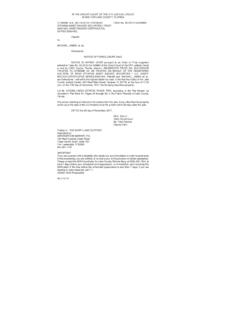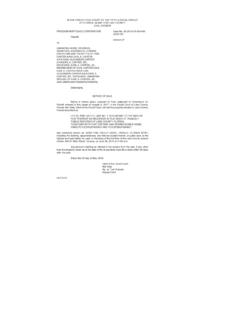Transcription of THE SUPREME COURT OF APPEAL OF SOUTH …
1 THE SUPREME COURT OF APPEAL OF SOUTH AFRICA JUDGMENT Case no: 741/12 REPORTABLE In the matter between: CAESARSTONE SDOT-YAM LTD APPELLANT and THE WORLD OF MARBLE AND GRANITE 2000 CC FIRST RESPONDENT OREN SACHS SECOND RESPONDENT MATITYAHU SACHS THIRD RESPONDENT AMIR SHALOM SACHS FOURTH RESPONDENT ALON SACHS FIFTH RESPONDENT AVIV SACHS SIXTH RESPONDENT 2 Neutral citation: Caesarstone Sdot-Yam Ltd v The World of Marble and Granite CC (741/12) [2013] ZASCA 129 (26 September 2013) Coram: MTHIYANE AP, MAYA, THERON et WALLIS JJA et VAN DER MERWE AJA Heard: 16 September 2013 Delivered: 26 September 2013 Summary: Defence of lis alibi pendens requirements defence available whenever a plea of res judicata would be available from decision in other action immaterial that party raising the plea is the plaintiff in the other proceedings exercise of discretion COURT s inherent power to regulate its proceedings.
2 3 ORDER On APPEAL from: Western Cape High COURT (Blignault J sitting as COURT of first instance): (a) The APPEAL is upheld with costs, such costs to include those consequent upon the employment of two counsel. (b) The order of the COURT below is set aside and replaced by the following order: 1 The special plea of lis alibi pendens in relation to the first and second plaintiffs is upheld with costs, such costs to include those consequent upon the employment of two counsel. 2 The special plea of lis pendens is dismissed in relation to the third to sixth plaintiffs. 3 The Plaintiffs action under WCHC Case No 10053/08 is stayed pending the final determination of the action instituted by the Defendant against the First and Second Plaintiffs in the Magistrates COURT , Haifa, Israel, under Case No A22497/07. JUDGMENT WALLIS JA (MTHIYANE AP, MAYA and THERON JJA and VAN DER MERWE AJA concurring) [1] The issue in this APPEAL is a preliminary question whether litigation commenced in Israel by the appellant, Caesarstone, justifies the stay of an action commenced by the respondents against Caesarstone in the Western Cape High COURT , in accordance with the doctrine of lis alibi pendens.
3 On 427 December 2007, Caesarstone instituted an action against the first respondent, to which I will refer as WOMAG, and the second respondent, Mr Oren Sachs, before the Magistrates COURT , Haifa in Israel. In June 2008, WOMAG and the members of the Sachs family, namely, Mr Oren Sachs, his father (the third respondent) and his three brothers (the fourth to sixth respondents) instituted an action in the Western Cape High COURT against Caesarstone. Both actions arose out of the same agreement. Caesarstone s response to the Western Cape action was to deliver a dilatory plea of lis alibi pendens asking that the action be stayed pending the final determination of the action it had instituted in Israel. The parties agreed that this plea should be disposed of separately and to that end agreed a statement of facts for the purposes of its adjudication.
4 Blignault J dismissed the plea and refused leave to APPEAL . The APPEAL is before us with leave of this COURT . [2] As its name indicates, a plea of lis alibi pendens is based on the proposition that the dispute (lis) between the parties is being litigated elsewhere and therefore it is inappropriate for it to be litigated in the COURT in which the plea is raised. The policy underpinning it is that there should be a limit to the extent to which the same issue is litigated between the same parties and that it is desirable that there be finality in litigation. The courts are also concerned to avoid a situation where different courts pronounce on the same issue with the risk that they may reach differing conclusions. It is a plea that has been recognised by our courts for over 100 1 Socratous v Grindstone Investments 2011 (6) SA 325 (SCA) para 13.
5 Its origins are to be found in the Digest sv De Exceptione Rei Iudicatae. 5[3] The plea bears an affinity to the plea of res judicata, which is directed at achieving the same policy goals. Their close relationship is evident from the following passage from Voet :2 'Exception of lis pendens also requires same persons, thing and exception that a suit is already pending is quite akin to the exception of res judicata, inasmuch as, when a suit is pending before another judge, this exception is granted just so often as, and in all those cases in which after a suit has been ended there is room for the exception of res judicata in terms of what has already been said. Thus the suit must already have started to be mooted before another judge between the same persons, about the same matter and on the same cause, since the place where a judicial proceeding has once been taken up is also the place where it ought to be given its ending.
6 ' [4] That passage was adopted and approved by De Villiers CJ in Wolff NO v Solomon3 and the requirements it spelled out for reliance on the plea have been reiterated on several occasions. For example, in rejecting a contention that proceedings before the Advertising Standards Authority and those before the Registrar of Patents warranted the invocation of the principle, Nugent AJA in Nestl ( SOUTH Africa) (Pty) Ltd v Mars said: 'There is room for the application of that principle only where the same dispute, between the same parties, is sought to be placed before the same tribunal (or two tribunals with equal competence to end the dispute authoritatively). In the absence of any of those elements there is no potential for a duplication of actions.' [5] WOMAG and the Sachs family contended that the litigation in Haifa was not between the same parties as that in SOUTH Africa; that the 2 Johannes Voet The Selective Voet being the Commentary on the Pandects (Gane s translation, 1957) Vol 6 at 560.
7 The passage appears in a chapter headed The Exception of Res Judicata . 3 Wolff NO v Solomon (1898) 15 SC 297 at 306-307. 4 Nestl ( SOUTH Africa) (Pty) Ltd v Mars Inc. 2001 (4) SA 542 (SCA) para 17. 6cause underpinning the two actions was different; and, that the relief being sought was also different. They contended that none of the requirements for the successful invocation of lis pendens were satisfied. Blignault J accepted these submissions. Accordingly he did not address the question whether he should in any event have refused a stay of the Western Cape action in the exercise of his discretion. [6] Caesarstone contends that Blignault J erred. It contends that the litigation in Israel is between it and WOMAG and Mr Oren Sachs, representing the Sachs family, and that the express citation of Mr Oren Sachs s father and brothers in the Western Cape proceedings does not alter the identity of the litigating parties in the two actions.
8 Alternatively it contends that there is a sufficient commonality of interest between Mr Oren Sachs and the other family members to satisfy this requirement. Second it contends that the substance of the causes of action in the two actions is the same because in both the central issue relates to the circumstances in which the agreement between the parties that gives rise to the dispute came to be terminated. Third it says that the relief being sought by the parties in the two actions (restitution by Caesarstone and damages by WOMAG and the Sachs family) is that which flows directly from the resolution of that central issue. In order to consider these contentions it is first necessary to deal with the facts. The facts [7] Caesarstone produces and markets quartz panels for use in the building industry. The panels are used in various environments, such as offices, kitchens and bathrooms, for counter tops, wall coverings and surrounds for domestic appliances such as baths.
9 From 2004 WOMAG had been its agent, responsible for the distribution of its products in SOUTH 7 Africa. That situation was changed in terms of the agreement that gives rise to the present litigation in Israel and SOUTH Africa to which I will refer as the agency agreement . [8] The agency agreement was concluded on 21 September 2006. It records that it is a declaration of principles applicable to the appointment of WOMAG and the Sachs family, represented by Mr Oren Sachs, as the sole agent in the territory of SOUTH Africa for quartz surface products under the brand name of Caesarstone. On signature of the declaration of principles the existing distribution agreement between WOMAG and Caesarstone would terminate and Caesarstone would appoint a new distributor for its products in SOUTH Africa. Thereafter a detailed agreement based on the declaration of principles was to be signed covering two periods of five years each, with a possible further extension of five years on condition that the agent fulfilled its obligations under the detailed agreement.
10 Under the detailed agreement WOMAG would receive a commission on the FOB price of all sales made by Caesarstone to the newly appointed distributor. In return for this commission it would act as Caesarstone s marketing advisor and representative, promoting its brand and products, assisting and overseeing the distributor. In addition WOMAG had the right in its own name to purchase slabs from Caesarstone presumably for the purposes of its own business in which event a commission would be paid to the Sachs family. Although the agency agreement does not spell this out the particulars of claim in the Western Cape litigation say that the Sachs family in terms of the agency agreement consists of Mr Oren Sachs, his father and his three brothers. [9] The claim document in the action before the Haifa Magistrates COURT sets out the agreement and those of its terms that Caesarstone 8regard as important for its cause of action.

















